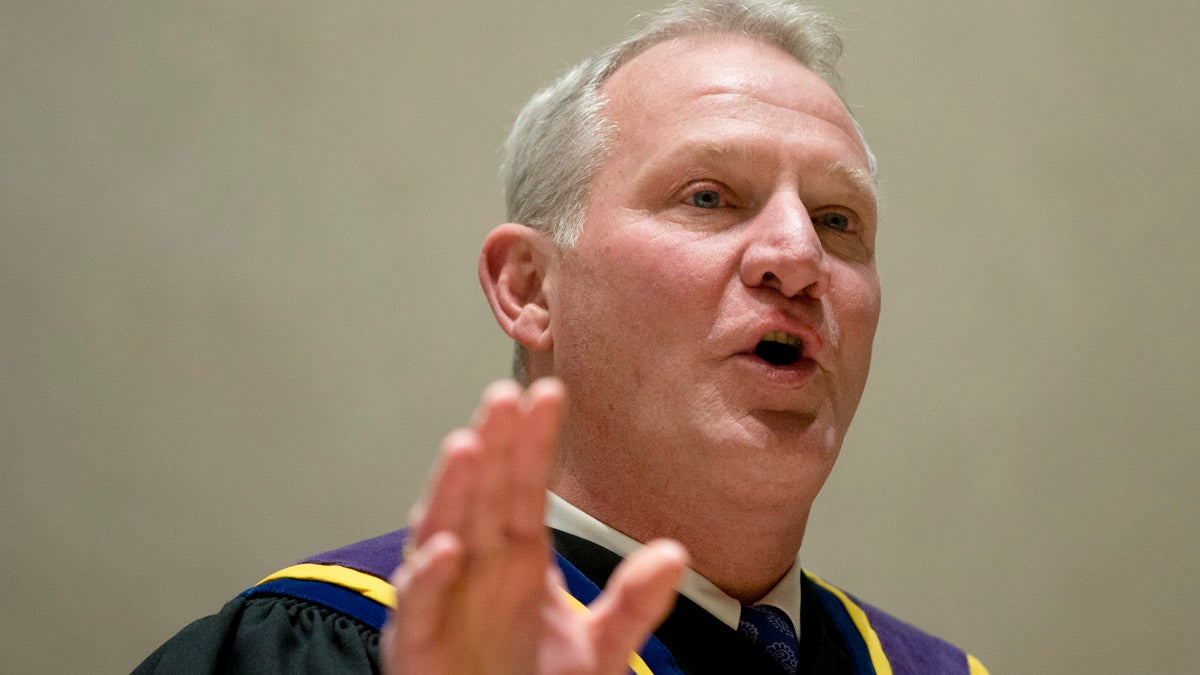Is Pa. ready for judicial merit selection?
Listen
The campaign of Pennsylvania Supreme Court Justice Kevin Dougherty raised $5.7 million to finance his successful bid for election last year. (AP file photo)
Fueled by anger over judicial corruption and runaway spending on last year’s state Supreme Court contests, the movement for merit selection of appellate judges in Pennsylvania seems to have picked up some traction this year.
A bill requiring the appointment of statewide appellate judges was approved in committee and poised for passage in the state House this week. The measure, House Bill 1336, has bipartisan sponsorship and the backing of Gov. Wolf and every living former governor.
Until recent days, judicial reform advocates hoped it might get a floor vote this week as the Legislature worked to approve a state budget.
That now appears unlikely.
“After years and years of talking about merit selection, there’s great momentum,” said state Rep. Madeleine Dean, D-Montgomery, who is co-sponsor of the bill.
Her Republican partner in the effort, Bryan Cutler of Lancaster County, has been working his colleagues for weeks.
“It’s a lot of one-on-one appointments, going to sit down and talk to folks and explain the idea to them,” he said.
The idea is that judges on the statewide appellate courts — Superior, Commonwealth and the Supreme Court — would no longer be elected.
The governor would appoint them from a list recommended by a panel of lawyers and non-lawyers. The appointees would be subject to confirmation by the state Senate, and, after four years on the bench, they would have to face voters in a retention election.
The idea’s been around for decades. Why is there more interest now?
Justice for sale?
Last year Pennsylvania set a national record for spending in a state Supreme Court race as voters cast ballots for three vacant positions.
According to the National Institute on Money in State Politics, the Supreme Court candidates raised and spent $15.5 million — and that doesn’t count the roughly $1 million in independent expenditures on the races.
The institute’s website, FollowtheMoney.org, has an enormous database of campaign finance information from every state that’s available in versatile and fairly user-friendly search tools.
As you can see in the chart below, Democratic candidates raised far more than their Republican rivals in 2015. They captured all three Supreme Court posts.
2015 Pa. Supreme Court Race — Funds raised by candidate
| CANDIDATE | PARTY | CONTRIBUTIONS |
| Kevin Dougherty | D | $5,650,148 |
| David Wecht | D | $3,585,854 |
| Christine Donohue | D | $2,157,650 |
| Anne Covey | R | $1,045,478 |
| Michael George | R | $967,982 |
| Judith Olson | R | $681,348 |
| John Henry Foradora | D | $641,272 |
| Anne Lazarus | D | $458,745 |
| Correale Stevens | R | $169,713 |
| Dwayne Woodruff | D | $79,608 |
| Cheryl Lynn Allen | R | $52,606 |
| Rebecca Lee Warren | R | $13,061 |
Source: National Institute on Money in State Politics – www.followthemoney.org
Dean and Cutler both said the heavy spending on those races made lawmakers more receptive to judicial appointment, as did Pennsylvania’s sorry record on judicial integrity in recent years.
Three justices have resigned or been forced out following allegations of improper and, in one case, criminal conduct.
Still a debate
Of course, judicial appointment has its opponents, and they don’t like calling it “merit selection.”
“It’s really political selection,” said Tom Previc, public affairs director of the Pennsylvania Association for Justice, formerly known as the Trial Lawyers Association.
“So we’re going to take the right of voting away from millions of voters in Pennsylvania, and we’re going to put it in the hands of politicians in Harrisburg?” Previc said of the judicial appointment proposal.
The Harrisburg politicians Previc refers to are the governor and state legislative leaders, who would appoint the panel that reviews and recommends candidates for judicial posts.
“It’s always a question of who picks the pickers,” he said.
Critics of electing judges say those millions of voters mostly have no idea who they’re voting for, and, in the end, a handful of political leaders end up picking judicial nominees anyway.
But opposition from the trial lawyers, as well as labor unions and anti-abortion rights groups have defeated past merit selection efforts.
What’s ahead?
Imposing the appointment of judges requires a change to the Pennsylvania Constitution, which means the merit selection bill would have to be approved in this session of the Legislature and again in the next session, and then, the proposal would then have to prevail in a statewide voter referendum.
Dean said it’s possible the bill could be approved in a special session this summer called to deal with the heroin epidemic, but she doesn’t think that’s likely.
“I hope I can continue to work on this with Rep. Cutler,” Dean said. “I think we can move this forward, but this is a constitutional amendment, and it’s going to take some time. We’ll have to keep growing support.”
2015 Pa. Supreme Court Race — Top Ten Donors
| CONTRIBUTOR | TOTAL GIVEN |
| Philadelphia Trial Lawyers Association | $2,365,267 |
| Electrical Workers Local 98 | $1,528,011 |
| Lowenthal, Gary | $500,000 |
| Pennsylvania Republican Party | $312,024 |
| Carpenters of Philadelphia & Vicinity | $301,100 |
| Pennsylvania Democratic Party | $265,491 |
| Electrical Workers Local 5 | $233,573 |
| PA Future Fund | $225,579 |
| New Gen 1 PAC | $179,400 |
Source: National Institute on Money in State Politics – www.followthemoney.org
WHYY is your source for fact-based, in-depth journalism and information. As a nonprofit organization, we rely on financial support from readers like you. Please give today.


